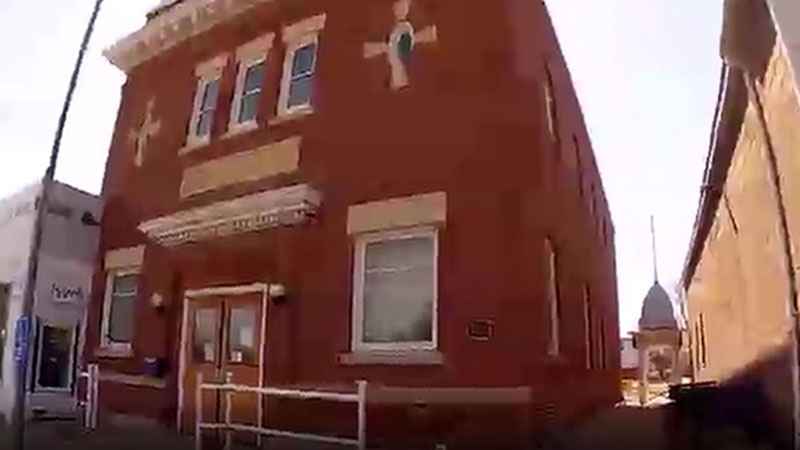More money, more questions: City hall remodel job using COVID-19 funds under scrutiny
[anvplayer video=”5019784″ station=”998122″]
As the federal government prepares to send another $2 billion in pandemic relief to local governments in Minnesota, some cities and towns are still under scrutiny over how they spent their first round of emergency aid to respond to COVID-19.
Despite guidance from the U.S. Treasury that all expenditures had to be "due to the public health emergency," a 5 INVESTIGATES review of spending reports from more than 1,400 municipalities across the state revealed plans to spend some of that money on questionable expenses such as a new golf course clubhouse, police riot gear and out of state travel.
City gets public backlash for spending federal COVID relief money on golf course clubhouse
Now some residents in the small city of Nerstrand are questioning a decision to spend all of their COVID-19 relief money on a long-desired remodel of city hall that wasn’t done to code and may require even more tax dollars to complete

Former city council member Kim Dekart cast the lone "no" vote in September when the city decided to spend nearly $24,000 to fix up the historic building’s second floor.
"They had looked at re-doing city hall many moons ago, years ago, but it wasn’t something that I thought the COVID money should be spent for," Dekart said.
In its report to the state, the city said the project would "allow for proper social distancing to conduct all city business," but six months later, the space is still incomplete. E-mail records reviewed by 5 INVESTIGATES show the second floor is not up to code to hold meetings.
In December, Deputy State Fire Marshal Tom Jenson alerted Dekart that "automatic fire sprinklers should have been installed."
"It was a mess in my eyes," Dekart said. "It’s not right. (The money) shouldn’t have been used for that. There are other people that probably needed it more than we did, other cities or communities."
Current and former council members in Nerstrand either declined interview requests or did not respond to phone calls.
In a statement to 5 INVESTIGATES, the city said it made its decision "following discussion of multiple options" and that the expenditures from the Coronavirus Aid Relief and Economic Security (CARES) Act included "the cost of insulation and provision of proper heat and electrical capabilities."
But there was no acknowledgment of the fact that the space still cannot be used.
Nerstrand Mayor Niki Portillo also declined to be interviewed on camera but said the city is now "trying to figure out grants" to complete the second floor.
"It’s heartbreaking," Portillo said over the phone. "The city was under the impression that if it did these things, it would be a useable space."
The League of Minnesota Cities, which has offered guidance to local governments, did not comment directly about the circumstances in Nerstrand or other municipalities but said determining how to spend CARES Act funds in a short amount of time last year was a "challenging process."
Amber Eisenschenk is a research manager with the League who moderated a series of online seminars to provide information to cities, towns and counties.
5 INVESTIGATES: Federal COVID-19 aid used to buy riot gear, ‘civil unrest equipment’
"Cities really came at it from so many different perspectives. Nobody was obviously starting in the same place in terms of how they were prepared for this type of pandemic," Eisenschenk said. "Occasionally, people had some creative ideas… So, there were certainly were times where we said, ‘You’re really going to need to think about that one hard.’"
After a 5 INVESTIGATES report n December, the City of Forest Lake scrapped plans to spend $150,000 on a new clubhouse for the city-owned golf course.
A government watchdog also raised concerns after 5 INVESTIGATES found the city of Big Lake used some of its federal relief on battering rams, riot shields and tactical training in Oklahoma.
"When it gets down to the local level, nobody’s really watching it," said Tom Schatz, president of the Washington D.C.-based Citizens Against Government Waste.
Now the federal government has pledged even more money to cities and towns through the American Rescue Plan Act which President Joe Biden signed into law in March.
But the strings attached are different this time around.
"It’s not so closely tied to COVID. There are some provisions for things like lost revenue," Eisenschenk said. "With the CARES Act funds, they had to make decisions rather quickly. With the American Rescue Plan Act, it’s a much slower process. You only get half of the funding upfront. The spending deadline is 2024, so decisions can be made at a more thoughtful pace."
Nerstrand, where the population is just under 300 people, did not receive enough COVID relief money to be subject to an automatic federal audit, but in the past, the state has said the U.S. Treasury has the power to review "any local government" and that any ineligible expenses could have to be repaid.
Below is the full statement from the City of Nerstrand:
In 2020, the City of Nerstrand received $23,280 through the federal Coronavirus Aid, Relief, and Economic Security Act. Following discussion of multiple options, the City Council opted to use the money to make changes to the second floor space in City Hall to make the space usable for city council and other public meetings during the COVID-19 health pandemic. The work included the cost of insulation and provision of proper heat and electrical capabilities.
The retrofit option was chosen with the intent of providing a larger and safer meeting space for residents and city officials that allows for the following of social distancing guidelines recommended by state and federal health officials. This space is needed to provide residents with a safer option for attending public meetings within the parameters of current state-determined capacity limits, while minimizing risk of COVID-19 spread among meeting attendees and presenters.